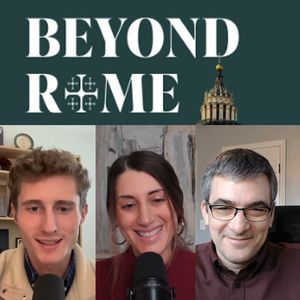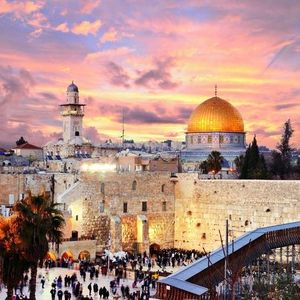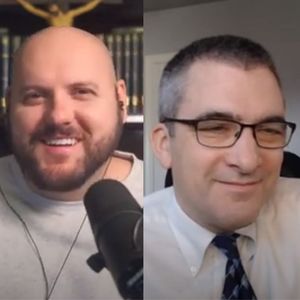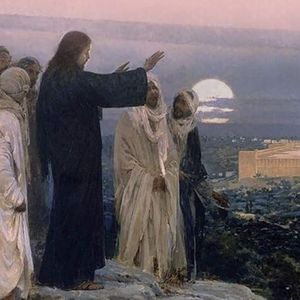


"Non voglio infatti che ignoriate, o fratelli, questo mistero...l'indurimento di una parte di Israele è in atto fino a che saranno entrate tutte le genti. Allora tutto Israele sarà salvato... Quanto al Vangelo, essi sono nemici, per vostro vantaggio, ma quanto alla elezione, sono amati, a causa dei padri, perchè i doni e la chiamata di Dio sono irrevocabili." (Rm 11,25-29)
Articoli sulla Chiesa e il popolo ebreo e sul ruolo di Israele nel piano di salvezza di Dio.
 On the Beyond Rome podcast, Simone Rizkallah and James O’Reilly are joined by Andre Villeneuve to discuss how Catholics should navigate between the two heresies of Supersessionism (or Replacement Theology) and Dual Covenant Theology.
On the Beyond Rome podcast, Simone Rizkallah and James O’Reilly are joined by Andre Villeneuve to discuss how Catholics should navigate between the two heresies of Supersessionism (or Replacement Theology) and Dual Covenant Theology.
 The central fact, which has its deepest meaning for the philosophy of history and for human destiny—and which no one seems to take into account—is that the passion of Israel today is taking on more and more distinctly the form of the Cross.
The central fact, which has its deepest meaning for the philosophy of history and for human destiny—and which no one seems to take into account—is that the passion of Israel today is taking on more and more distinctly the form of the Cross.
 The horrific Hamas attacks on Israel on October 7, 2023 and the ensuing war in Gaza have raised many questions among Catholics: Should they support Israel? Does modern Israel still benefit from any kind of special status today as God’s chosen nation, or should we view it as a purely secular political entity like every other state? This article will consider these questions and seek to provide some basic theological and catechetical principles and guidelines for Catholics concerning the “mystery of Israel.”
The horrific Hamas attacks on Israel on October 7, 2023 and the ensuing war in Gaza have raised many questions among Catholics: Should they support Israel? Does modern Israel still benefit from any kind of special status today as God’s chosen nation, or should we view it as a purely secular political entity like every other state? This article will consider these questions and seek to provide some basic theological and catechetical principles and guidelines for Catholics concerning the “mystery of Israel.”
Leggi tutto: Why Israel Matters: The Biblical Roots of Catholic Zionism
 Il dono incondizionato dell'elezione del popolo ebraico è il fondamento teologico del sionismo cattolico. Molti testi del Nuovo Testamento sostengono l'idea che i cattolici dovrebbero approvare il sionismo. Gesù stesso era un sionista ebreo cristiano. I cattolici riconoscono che il popolo ebraico ha ancora un ruolo provvidenziale da svolgere, e il suo ritorno in terra d’Israele può essere parte del piano di redenzione, ancora da compiere.
Il dono incondizionato dell'elezione del popolo ebraico è il fondamento teologico del sionismo cattolico. Molti testi del Nuovo Testamento sostengono l'idea che i cattolici dovrebbero approvare il sionismo. Gesù stesso era un sionista ebreo cristiano. I cattolici riconoscono che il popolo ebraico ha ancora un ruolo provvidenziale da svolgere, e il suo ritorno in terra d’Israele può essere parte del piano di redenzione, ancora da compiere.
 Il sionismo cristiano di solito è respinto da chi lo critica per uno o più di questi tre motivi: (1) dicono elimini completamente il Nuovo Testamento, dove l'attenzione dell'Antico Testamento su una particolare terra è sostituita da una visione che ha a che vedere con il mondo intero; (2) pensano sia l’unica preoccupazione dei dispensazionalisti premillenaristi; (3) si dice che sia più politico che teologico, legato ai partiti politici americani e israeliani di destra che identificano impropriamente l'attuale Stato israeliano con l'eschaton. Alcuni studiosi hanno recentemente sostenuto la causa di un "nuovo" sionismo cristiano che adotta un approccio inedito rispetto a questi tre problemi.
Il sionismo cristiano di solito è respinto da chi lo critica per uno o più di questi tre motivi: (1) dicono elimini completamente il Nuovo Testamento, dove l'attenzione dell'Antico Testamento su una particolare terra è sostituita da una visione che ha a che vedere con il mondo intero; (2) pensano sia l’unica preoccupazione dei dispensazionalisti premillenaristi; (3) si dice che sia più politico che teologico, legato ai partiti politici americani e israeliani di destra che identificano impropriamente l'attuale Stato israeliano con l'eschaton. Alcuni studiosi hanno recentemente sostenuto la causa di un "nuovo" sionismo cristiano che adotta un approccio inedito rispetto a questi tre problemi.
 Gerald McDermott esamina il supersessionismo nella teologia cristiana, il concetto secondo il quale le promesse fatte al popolo ebraico presenti nell’Antico Testamento, tra cui quella di una terra, siano state superate dalla Chiesa cristiana. Ritiene che questa visione abbia prevalso nelll'interpretazione cristiana a partire dal IV secolo, causando dunque l'esclusione dei riferimenti a tale promessa presenti nel Nuovo Testamento. McDermott fornisce nel Nuovo Testamento, prove che confutano il supersessionismo, e sostiene che riconoscere la rilevanza della promessa di una terra, ancora in corso ai nostri giorni, sia di vitale importanza per comprendere l'affidabilità di Dio e il compimento delle sue promesse.
Gerald McDermott esamina il supersessionismo nella teologia cristiana, il concetto secondo il quale le promesse fatte al popolo ebraico presenti nell’Antico Testamento, tra cui quella di una terra, siano state superate dalla Chiesa cristiana. Ritiene che questa visione abbia prevalso nelll'interpretazione cristiana a partire dal IV secolo, causando dunque l'esclusione dei riferimenti a tale promessa presenti nel Nuovo Testamento. McDermott fornisce nel Nuovo Testamento, prove che confutano il supersessionismo, e sostiene che riconoscere la rilevanza della promessa di una terra, ancora in corso ai nostri giorni, sia di vitale importanza per comprendere l'affidabilità di Dio e il compimento delle sue promesse.
Leggi tutto: Perché le promesse della terra appartengono all'Israele etnico
 Dr. André Villeneuve discusses the role of Israel in the age of the Church on Michael Lofton's "Reason and Theology" podcast. Topics include God's covenant with Israel, supersessionism, the idea of the Church as "new Israel", Israel's role in the age of the Church, the modern state of Israel, Zionism, the Israeli-Palestinian conflict, and Israel's role in regard to Jesus' Second Coming.
Dr. André Villeneuve discusses the role of Israel in the age of the Church on Michael Lofton's "Reason and Theology" podcast. Topics include God's covenant with Israel, supersessionism, the idea of the Church as "new Israel", Israel's role in the age of the Church, the modern state of Israel, Zionism, the Israeli-Palestinian conflict, and Israel's role in regard to Jesus' Second Coming.

According to Luke-Acts, Jerusalem possesses a unique status not only because "the kingdom of Christ" is "historically anchored" there, but even more because that kingdom will achieve its eschatological consummation within its walls.
 God has tied His saving and redemptive concern for the welfare of all men to His love for the people of Israel. Only those who love the people of Israel can love the God of Israel. Israel is thus God's first-born, most precious in His eyes. -- Michael Wyschogrod (1928-2015)
God has tied His saving and redemptive concern for the welfare of all men to His love for the people of Israel. Only those who love the people of Israel can love the God of Israel. Israel is thus God's first-born, most precious in His eyes. -- Michael Wyschogrod (1928-2015)
 The most repeated divine promise in the Hebrew Scriptures (the Old Testament) is God's gift of the Land of Canaan to the descendants of Abraham, Isaac and Jacob—the people of Israel. Here is a compilation of these verses.
The most repeated divine promise in the Hebrew Scriptures (the Old Testament) is God's gift of the Land of Canaan to the descendants of Abraham, Isaac and Jacob—the people of Israel. Here is a compilation of these verses.
Leggi tutto: God's Promise of the Land to the People of Israel
 The words "Israel" and "Israelite" occur 77 times in the New Testament. Is "Israel" ever used as a synonym for the Church? How many times does the NT use the expression "new Israel" or "true Israel" to refer to the Church?
The words "Israel" and "Israelite" occur 77 times in the New Testament. Is "Israel" ever used as a synonym for the Church? How many times does the NT use the expression "new Israel" or "true Israel" to refer to the Church?